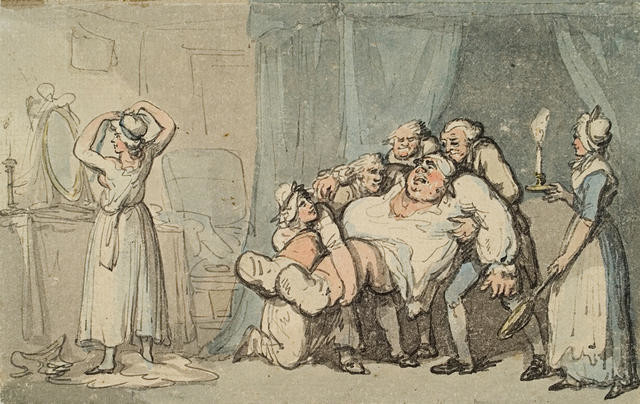The heath this night must be my bed,
The bracken curtain for my head,
My lullaby the warder's tread,
Far, far, from love and thee, Mary;
To-morrow eve, more stilly laid,
My couch may be my bloody plaid,
My vesper song thy wail, sweet maid!
It will not waken me, Mary!
. . . . .
A time will come with feeling fraught,
For, if I fall in battle fought,
Thy hapless lover's dying thought
Shall be a thought on thee, Mary.
And if returned from conquered foes,
How blithely will the evening close,
How sweet the linnet sing repose,
To my young bride and me, Mary!
Walter Scott, Norman's song D 846
Scott’s ‘The Lady of the Lake’, from which these verses are taken, tells the story of the rising of Clan-Alpine against King James V of Scotland. This lyric is sung by Norman, who was leaving church with his bride when he was summoned to a mustering of the clan in preparation for battle. Norman has to leave behind his wedding bed and prepare to bed down in the open air. There is a serious possibility that his bed the following night will be an unmarked grave on the battlefield.
We are thus introduced to three of the types of ‘bed’ that appear in the Schubert song texts: the bridal bed (or more generally ‘going to bed’ with all its sexual connotations); soldiers trying to sleep on the night before a battle; the grave as the bed where we take our final sleep. We see in ‘Normans Gesang’ that the concepts are not distinct. Poets play with overtones and ambiguities.
This is very common in lullabies, where another of the associations of beds (simply having a good night’s sleep or rest) is often tinged with premonitions of death and the grave.
Wie dir ein Engel
Faltet die Händchen,
Falte sie einst so:
Gehst du zur Ruh;
Look at how an angel
Is folding your little hands;
There will come a time when they are similarly folded,
When you go to your rest;
Seidl, Wiegenlied D 867
One of Schubert’s most famous lullabies is the final song of Die schöne Müllerin, Des Baches Wiegenlied (The little river’s lullaby), in which the miller boy is rocked to sleep / death on a river bed:
Will betten dich kühl,
Auf weichen Pfühl,
In dem blauen krystallenen Kämmerlein.
Heran, heran,
Was wiegen kann,
Woget und wieget den Knaben mir ein.
I shall give you a cool bed
And put you on a soft pillow
In this little room of blue crystal.
Come along, come along,
Anything that can rock,
Lull and rock this lad for me!
Müller, Des Baches Wiegenlied D 795/20
Many of the texts about evening and the setting sun set by Schubert focus on the need for rest and peace and a longing for sleep (or death). Usually these texts present ‘going to bed’ as a welcome prospect. There is an offer of solace and comfort. However, Schubert’s friend Mayrhofer (who had suicidal inclinations) to some extent challenged this tradition and wrote a very odd and unsettled text about how improbable it was that he (we) would have an undisturbed night. The only way to find rest will be if we somehow ‘protect our dreams’ and take care to ‘shelter the sacred flame.’
Es träumen die Wolken,
Die Sterne, der Mond,
Die Bäume, die Vögel,
Die Blumen, der Strom,
Sie wiegen,
Und schmiegen
Sich tiefer zurück,
Zum tauigen Bette,
Zur ruhigen Stätte,
Zum heimlichen Glück.
Doch Blättergesäusel
Und Wellengekräusel
Verkünden Erwachen.
Denn ewig geschwinde,
Unruhige Winde,
Sie stören, sie fachen.
Erst schmeichelnde Regung,
Dann wilde Bewegung,
Und dehnende Räume
Verschlingen die Träume.
Im Busen, im reinen,
Bewahre die deinen,
Es ströme dein Blut,
Vor rasenden Stürmen
Besonnen zu schirmen
Die heilige Glut.
The clouds are dreaming,
As are the stars, the moon,
The trees, the birds,
The flowers, the river.
They are swaying
And settling
Down more deeply
Into the dewy bed,
Into peaceful spots,
Into secret happiness.
Yet the rustling of the leaves
And the rippling of the waves
Forebode an awakening.
Since they are eternally in motion,
Restless winds
Disturb and stir them.
First with a flattering agitation
Then with wild disturbance;
And space stretches out,
Devouring their dreams.
Within your pure breast
Protect your own dreams;
Let your blood flow:
Beware of the raging storms and
Carefully shelter
The sacred flame.
Mayrhofer, Beim Winde D 669
☙
Descendant of:
THE HUMAN BODY THE COURSE OF HUMAN LIFE: From the cradle to the grave MOVEMENT TIMETexts with this theme:
- Erinnerung (Kein Rosenschimmer leuchtet), D 101 (Friedrich von Matthisson)
- Nachtgesang (O! gib vom weichen Pfühle), D 119 (Johann Wolfgang von Goethe)
- Auf einen Kirchhof, D 151 (Franz von Schlechta)
- Minona oder die Kunde der Dogge, D 152 (Friedrich Anton Franz Bertrand)
- Sehnsucht der Liebe, D 180 (Theodor Körner)
- Der Liebende, D 207 (Ludwig Christoph Heinrich Hölty and Johann Heinrich Voß)
- Grablied, D 218 (Joseph Kenner)
- Lieb Minna, D 222 (Albert Stadler)
- Die Täuschung, D 230 (Ludwig Theobul Kosegarten)
- Abendlied (Groß und rotentflammet), D 276 (Friedrich Leopold Graf zu Stolberg-Stolberg)
- An die untergehende Sonne, D 457 (Ludwig Theobul Kosegarten)
- Beim Winde, D 669 (Johann Baptist Mayrhofer)
- Der Unglückliche / Die Nacht, D 713, D deest (Caroline Pichler)
- Des Müllers Blumen, D 795/9 (Wilhelm Müller)
- Des Baches Wiegenlied, D 795/20 (Wilhelm Müller)
- Der Einsame, D 800 (Karl Lappe)
- Normans Gesang, D 846 (Walter Scott and Philip Adam Storck)
- Zur guten Nacht, D 903 (Friedrich Rochlitz)
- Ständchen (Zögernd leise), D 920 (Franz Grillparzer)
- Vor meiner Wiege, D 927 (Carl Gottfried von Leitner)
- Kriegers Ahnung, D 957/2 (Ludwig Rellstab)


